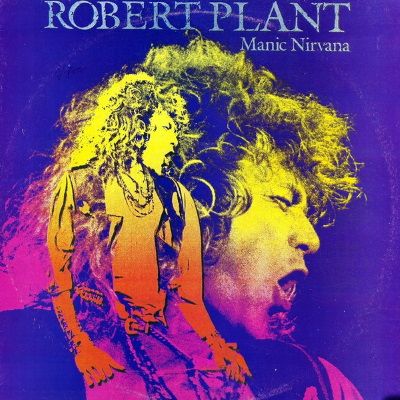I found myself surfing the Net,
For my Citrix connection had been lost.
Ah me! how hard a thing to turn away
What was this world wide web savage, rough, and stern,
Which in the very thought renews the boredom.
So bitter is it, death is little more;
But of the good to treat, which there I found,
Speak will I of the other things I saw there
But when it comes to albums that instantly take me back to high school, Manic Nirvana (and one other which I won't name because it may get a post of its own) stands out from all the rest.
I listened to Robert Plant's fifth solo album quite a lot as my senior year of high school was drawing to a close. I eventually bought the singles so I would have all the non-album b-sides. Those were all collected on a CD re-release at some point which was handy as the years progressed and CD rack space became ever rarer. Whatever the album's merits and weaknesses may be, I will forever associate it with those last few months of high school. Just seeing the album cover stirs feelings of nostalgia within me. And listening to it - any song, really - brings back scenes of singing along to it with friends and those feelings of anticipation and the restlessness along with the anxiousness. That eagerness to leave small town Wisconsin and childhood behind that is invariably accompanied by the unease of the fledgling leaving the nest.
So how does Manic Nirvana hold up some 30 years later?
After John Bonham died in the fall of 1980 and Zeppelin called it a day, Plant was back in the studio the following spring to begin carving out his new career. Over the course of three albums, Plant moved away from Zeppelin with his solo stuff eschewing the big riffs of his former band. On the concert stage he refused to perform Zeppelin songs. By 1988, though, Plant had come around to the conclusion that Zeppelin wasn't a bad reputation to own as the Now and Zen album featured Jimmy Page on a couple tracks as well as some Zep samples. In addition Plant began to perform Zeppelin classics live.
And so the most noticeable thing about 1990's Manic Nirvana was that the first side was full of chunky guitar riffs and Plant's orgasmic moans and screams. These songs were, in many ways, the most Zeppelin-like of his solo career. Minus Plant's voice, "Big Love" is indistinguishable from any cock rock band of the period with mantras like "She loves to go down". This shouldn't be surprising considering all the mullets band members were sporting back then. If he was going to do a knock-off of a current pop muso, Prince wasn't a bad choice for "SSS&Q". But it suffers like a lot of music from the time in that nearly every nook and cranny was filled with a bit of electronic percussion or synth flourishes. "I Cried" with its acoustic guitar and atmospheric waves of electric guitar harkened back to Plant's early solo material.
On the other hand, there's a lot more going on here than just the return of big riffs with instead a variety of styles and influences at play. I never made the Prince connection in "SSS&Q" when I listened to the album in high school so it was nice to hear something new after all these years. Looking back, the Middle Eastern tinged "Watching You" foreshadowed Plant's Unledded collaboration with Jimmy Page in 1995 along with many other songs on later albums. No matter how cheesy the drum programming sounds today, "Tie Dye on the Highway" still has a great riff. And "Your Ma Said You Cried in Your Sleep Last Night" is still blatantly catchy and brings back memories of cruising to Eau Claire with a friend singing all the while.
My impression is that this album has fallen out of favor with the man himself as only one song from it made the cut for Sixty Six to Timbuktu. This is perhaps understandable since it sounds very much like a product of its time and Plant has gone off in other directions. However, it's not exactly fair as the performances themselves are generally excellent with Plant in fine form throughout, proving that he could still scream like the young punk who recorded "Whole Lotta Love" some twenty years earlier. And some credit is due since Plant, who was in his early 40s when he did the album, created something contemporary instead of simply retreading his Zeppelin years.
Regarding this last point: at the time Manic Nirvana was released, my hope for Robert Plant solo albums (and Jimmy Page solo efforts too) was for them to be very Zeppelin-ey. I suppose this means guitar riffs and more of a 1970s sound. This isn't to say that I didn't like Plant's solo work up until this point - "In the Mood", for example, is a great song - but I was hoping for an album more retro. While Manic Nirvana could never be mistaken for his former band, it was something almost, but not quite entirely unlike Zep. Big riffs, a toe in the waters of world music, and affection for R&B and rock'n'roll, are all elements heard in Led Zeppelin. But here they sound contemporary (for 1990), they go off in their own directions.
After Manic Nirvana I became more content with Plant's solo work being just that. I judged Fate of Nations on its own merits rather than how much it sounded or didn't sound like Led Zeppelin.

No comments:
Post a Comment